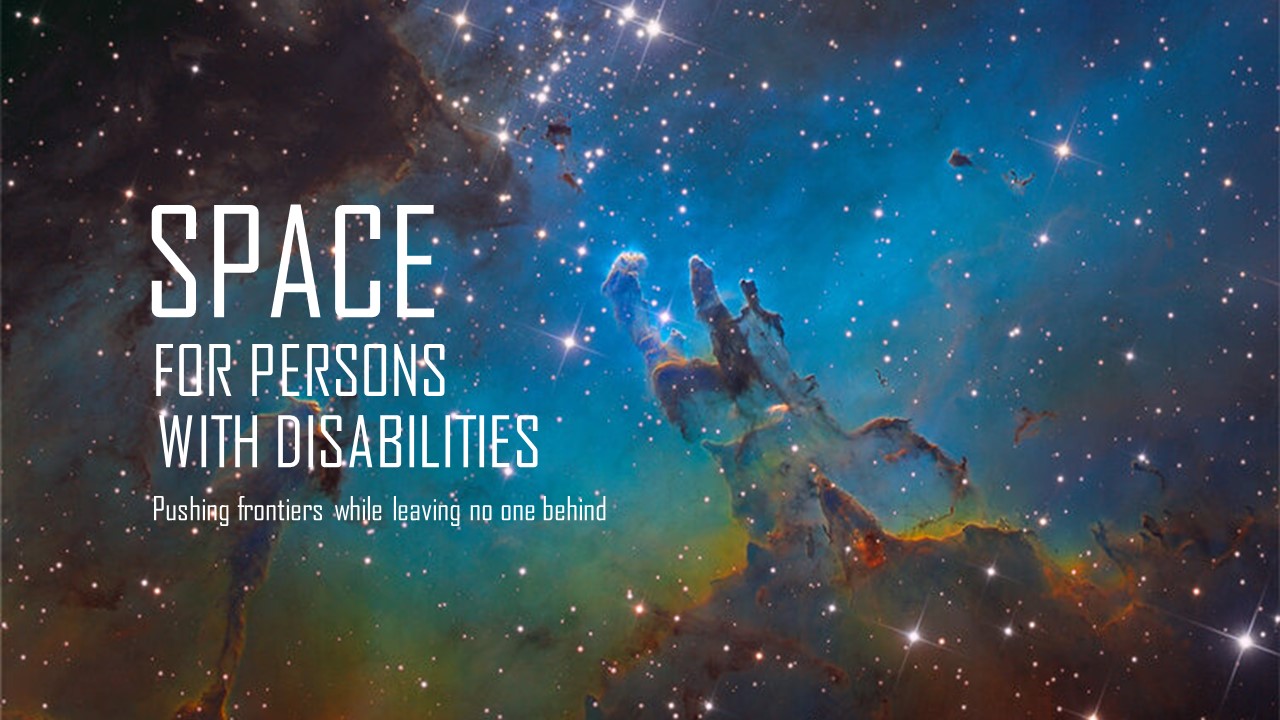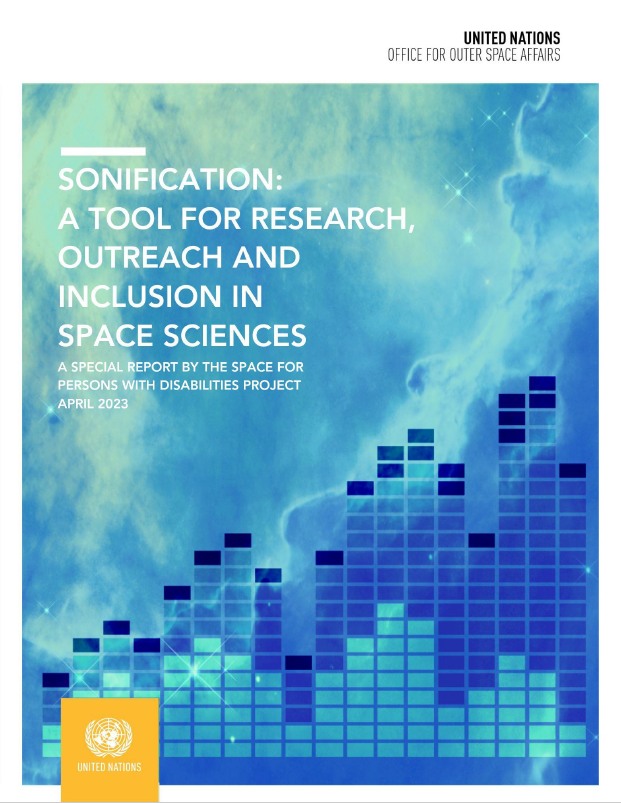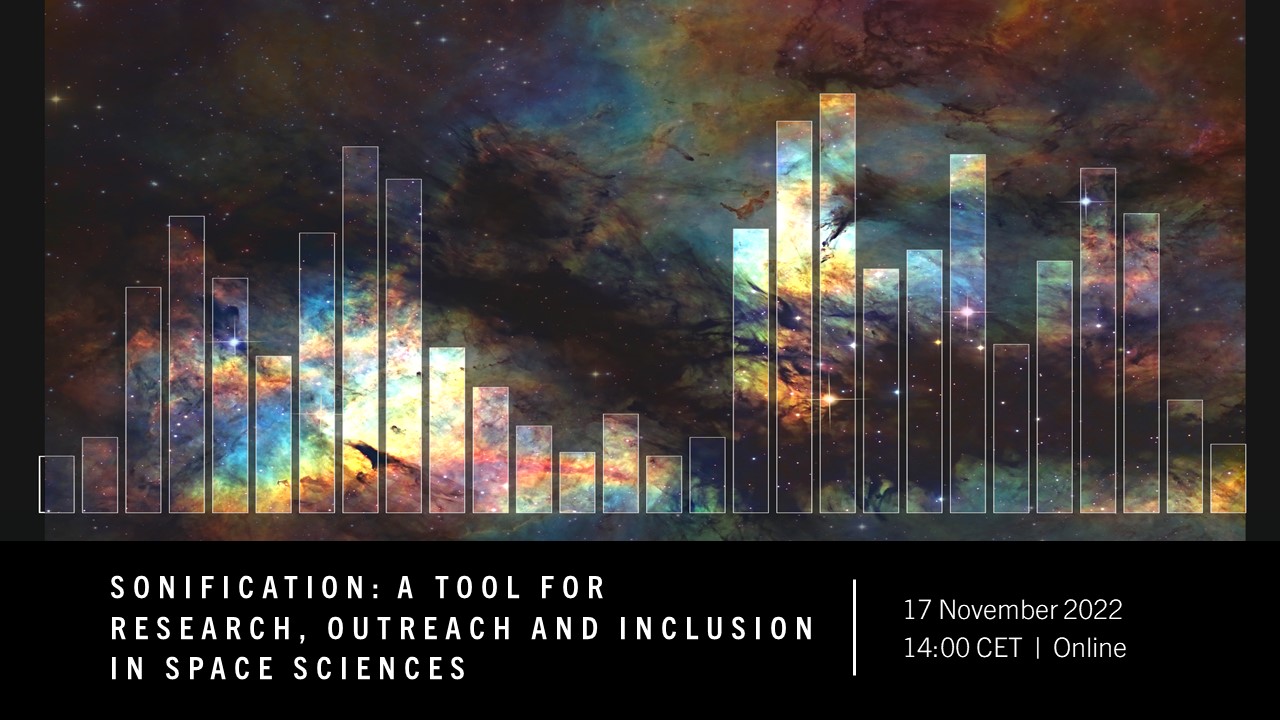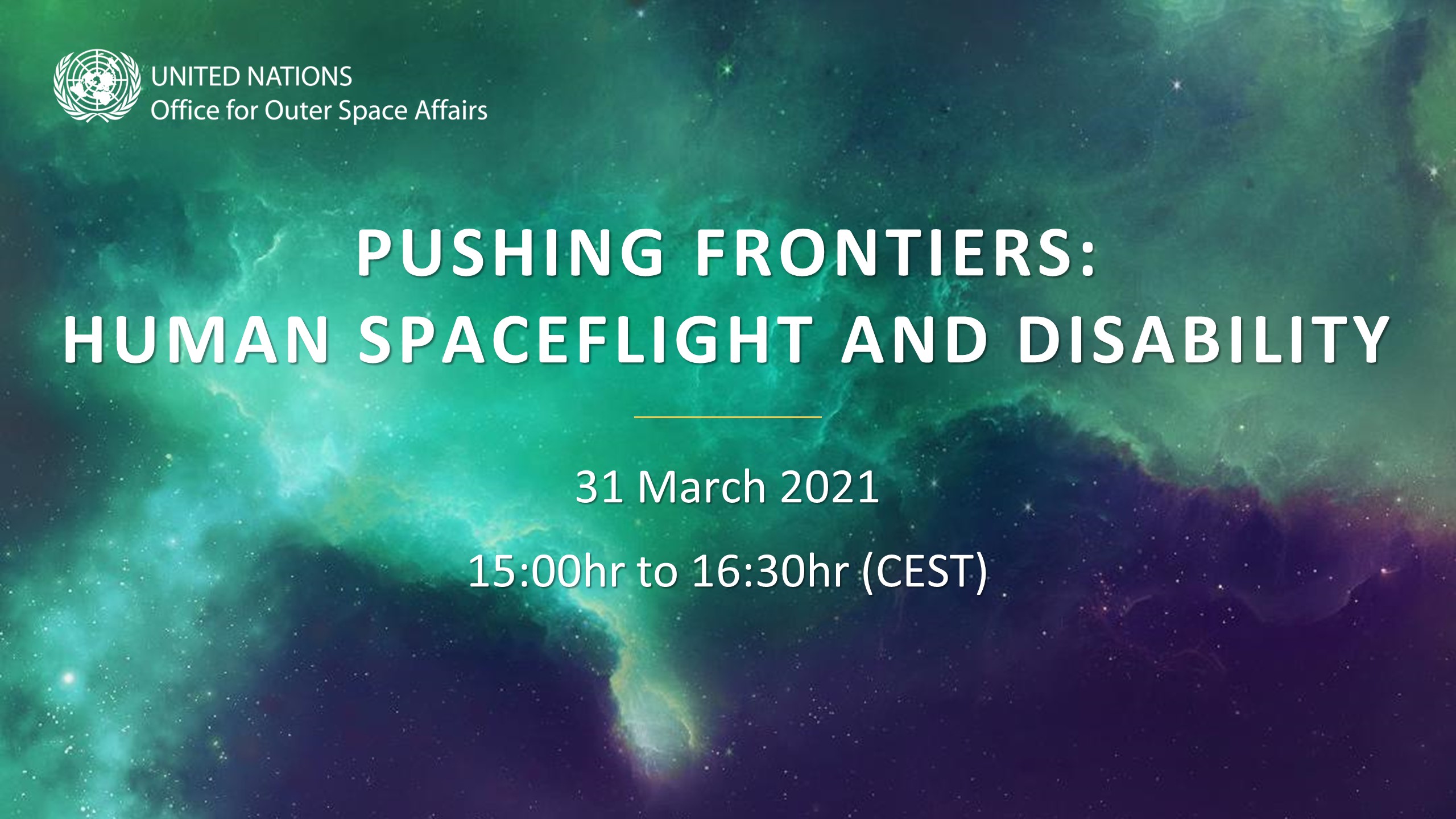Space for Persons with Disabilities
Removing barriers and advancing inclusive and equitable development in space

(Above) Image of the Eagle Nebula, also known as Messier 16 or M16. These towering tendrils of cosmic dust and gas are also named "Pillars of Creation" and are part of an active star-forming region within the nebula and hide newborn stars in their wispy columns. Image credit and copyright:
Martin Pugh
Latest information Introduction Our initiative Our strategy Our activities
Outreach International observance How to get involved Where can I begin Resources
Latest Information
- "From Space to Earth: innovations enabling accessibility on Earth" webinar video is now available on YouTube. Click
here to watch the video. Read the interview articles and more
here .
- "Space+: Pathways for all abilities" interview series with disability advocates and persons with disabilities in space science and associated fields is now available
online . Read their stories today!
- "Notes from the Underground: The Music of Earth's Magnetic Field" interview with Klaus Nielsen, project coordinator of the "Sound of Earth's Magnetic Field" audio installation, is now available
online .
- OOSA's special report on "Sonification: a tool for research, outreach and inclusion in space sciences" is available
online .
- Are you interested to volunteer for the Space for Persons with Disabilities project? Find out more about online volunteering opportunities
here or write to oosa@un.org. Persons with disabilities are encouraged to apply.
Introduction
Persons with disabilities include those who have long-term physical, psychosocial, intellectual or sensory impairments which in interaction with various barriers may hinder their full and effective participation in society on an equal basis with others (Convention on the Rights of Persons with Disabilities, art. 1). An estimated one billion people, or 15% of the world's population experience some form of disability. 80% of them are in developing countries. One-fifth of the estimated global total, or between 110 million and 190 million people, experience significant disabilities.
Disability is a global public health issue, human rights issue and development priority.
Persons with disabilities, on average as a group, are more likely to experience adverse socioeconomic outcomes such as lower education, poorer health, lower levels of employment, and higher poverty rates than persons without disabilities. According to a research by the International Labor Organization (ILO), economic losses related to the exclusion of persons with disabilities from the labour force ranges from between 3 and 7 per cent of Gross Domestic Product (GDP).
These numbers may be surprising to many because disability may not always be physically apparent. Disabilities come in various forms and persons may have the disabilities at different points in their life (at birth, or acquired later in life, during education, or while in employment). The number of people with disabilities is expected to increase over the coming decades, due to population aging, longer life expectancy, and an increasing number of injuries resulting from natural disasters, among other factors. Many people will experience a disability at some stage in their lives.
Global population of persons with disabilities. Infographic from UN Disability-Inclusive Communications Guidelines (IASC Guidelines, 2019, Inclusion of Persons with Disabilities in Humanitarian Action)
Due to discrimination, stigma, inadequate policies and programmes, lack of support and assistance, persons with disabilities are often prevented from joining the wider society in education or in employment. The challenges in Science, Technology, Engineering and Mathematics (STEM) fields are particularly acute. Many barriers to use or access knowledge and resources as effectively as persons without disabilities still exist and prevent the participation of persons with disabilities in research and activities necessary for advancement in the field.
At the United Nations Office for Outer Space Affairs (UNOOSA), we believe that space can contribute in many important ways to achieving disability inclusion and can have transformational effects for persons with disabilities. Building an inclusive society is everyone's responsibility. Only through collective efforts will we successfully build an inclusive and equitable community where we are able to make progress while leaving no one behind.
Our Initiative
Recognizing the rights of persons with disabilities in accordance with The United Nations Convention on the Rights of Persons with Disabilities (CRPD) and aligning with the UN Disability Inclusion strategy, UNOOSA embeds the rights of persons with disabilities in its programmes and works towards mainstreaming disability in its activities.
The aim of the Space for Persons with Disabilities project is to promote inclusive and equitable development in the space sector by advocating for the rights of persons with disabilities, raising awareness of the need for new access technologies, fostering cooperation towards disability mainstreaming, and engaging decision-makers to facilitate and assist initiatives targeting inclusivity in space.
In doing so, the project strives to contribute to achieving SDG 10: Reduced Inequalities, in addition to SDG 4: Quality Education, SDG 8: Decent Work and Economic Growth, and SDG 17: Partnerships for the Goals.

Our Strategy
A integrated and systematic approach to disability inclusion in all areas of operations and programming, internally and externally, is required to ensure that persons with disabilities are not left behind. Building on the vision of achieving sustainable and transformative progress on disability inclusion in space, UNOOSA adopts a two-pronged approach to disability inclusion.
First, the Office mainstreams disability in its internal processes and broader work with consideration for disability-related perspectives.
Second, the Office develops disability-specific programmes through informed and meaningful involvement of persons with disabilities. The programme consists of two main focus areas; technology and people. The first focus area is on innovative tools and technologies enabling accessibility, while the second is on inclusive practices with the aim to remove barriers and enhance the recruitment, retention and promotion of persons with disabilities in the space sector.
Through education and public outreach, capacity-building activities and partnerships with stakeholders, the Space for Persons with Disabilities project leads the Office's disability inclusion strategy.
Our Activities
Focus area 1: Innovative tools and technologies enabling accessibility
"From Space to Earth: Innovations enabling accessibility on Earth" webinar and interview series (9 November 2023)

When it comes to space technologies, the first thoughts that come to most people's minds are rockets, spaceships, and astronauts. But the benefits of going above and beyond can be found here on Earth through products and services originating from space innovations. Following the UN/WHO Space for Global Health conference 2023 , UNOOSA hosted a webinar to explore space-based technologies that improve accessibility, health care and quality of life for persons with disabilities. This event will bring together experts in the fields of physiology, robotics, accessibility and more, to showcase creative and impactful technologies, discuss the current state of space for global health, emerging trends and opportunities for start-ups and SMEs.
Read this webpage to learn about the value of space technologies for health and accessibility and read articles about specific innovations and interviews with the creator.
Click here to watch the video recording.
"Sound of Earth's Magnetic Field" audio installation at VIC (May-June 2023)

The "Sound of Earth's Magnetic Field: An Audio Installation using Sonification for Accessibility in Space Sciences" was displayed at the Vienna International Centre (VIC), home of the United Nations Office of Outer Space Affairs, during the 66th session of the Committee on Peaceful Uses of Outer Space (COPUOS) from 31 May to 9 June 2023. Using a multi-channel speaker system, the audio conveys changes in the Earth's magnetic field over the past 100,000 years as well as spatial variations in the strength of the magnetic field.
In this interview, Klaus Nielsen, project coordinator at the Technical University of Denmark, discusses the inspiration behind this project, the technical work that went into converting satellite data to audio, the institutional difficulties sonification projects face, and future directions which sonification may take. Between mentions of turtle sounds hidden in the final audio and the difficulty of outreach through SoundCloud, an overwhelming message emerges: data and sound are inextricably linked, and artistic sonification projects can bring awareness to this magnificent connection. Sonification presents data in a new manner and makes the space sciences more accessible for persons with disabilities, particularly individuals who are blind or visually impaired. read more
Special report "Sonification: a tool for research, outreach and inclusion"

This is a special report focusing on a particular innovative technology, sonification, for space science research, outreach and inclusion. This report aims to provide a comprehensive overview of sonification in terms of its contribution to space science and accessibility, challenges in mainstreaming, and makes recommendations to address these issues, in particular with the goal of developing and implementing sonification as a universal tool for space science research and communication that is accessible to BVI researchers. This report hopes to stimulate a global dialogue and shift the paradigm in attitudes and approaches to persons with disabilities in space. read more
Online event "Sonification: a tool for research, outreach and inclusion" (17 November 2022)

The importance of science, technology and innovation will only grow in future. It is imperative to ensure that everyone is empowered to access space science and contribute to international cooperation in the peaceful use and exploration of space. However, for persons who are blind and visually impaired (BVI), there are huge barriers to accessing the opportunities afforded by space science. One such barrier is the sector's reliance on data visualisation for research, outreach, and education. The power of spectacular images of space to inspire and spark curiosity is unquestionable, but by assuming that sight is the only way to explore space we exclude the BVI community, who have equal right to full participation in space sciences. By exploring different ways to interpret and communicate data, including through sonification, we open doorways to new discoveries and a more inclusive future.
This online event aims to explore sonification as a tool that has the potential to contribute to scientific research, outreach and disability inclusion. This event comprises of two segments. Segment one showcases a diverse range of sonification projects in space science while segment two is a panel discussion where we unpack the complexities surrounding the use of sonification in space science.
The panel discussion will bring together professional astronomers, and experts in sound perception, science communication and accessibility, to discuss the current state of sonification in space science, challenges in implementation, recommendations on how to facilitate the advancement and adoption of sonification in space science research and outreach, and what to expect in the coming years.
Find out more about the event here .
The video for segment 1 is available on UNOOSA's YouTube channel via this link .
The video recording of the panel discussion is available here. The transcript is available here.
"Pushing Frontiers: Human Spaceflight and Disability" webinar (31 March 2021)

On 31 March 2021, UNOOSA organized a "Pushing Frontiers: Human Spaceflight and Disability" webinar with support from the European Space Agency (ESA). Watch this multi-disciplinary webinar to learn about the ESA Parastronaut Feasibility Project and explore the challenges and opportunities in this emerging field through the lens of technology, engineering, physiology, psychology and team dynamics. Also, be inspired by Eddie Ndopu, a UN SDG advocate and aspiring astronaut.
Click
here to learn more about the webinar.
Click
here to watch the webinar.
Parastronauts: Defining accessibility in human spaceflight (coming soon)
More information coming soon.
Focus area 2: From employment to empowerment
UNOOSA inclusive internship (ongoing)
At UNOOSA, we believe that everyone has unique strengths and skills. We strive to create a diverse and inclusive workplace where persons with disabilities are empowered to share their perspectives and shine. We understand that diversity makes us better as an organisation and helps us become more effective as partners to our stakeholders in achieving the Sustainable Development Goals.
This internship under the Space for Persons with Disabilities project is a unique opportunity for individuals to build skills, expand their professional network and gain work experience under the supervision of dedicated UN staff members. This internship is open to all qualified applicants. Persons with disabilities are strongly encouraged to apply. While both persons with and without disabilities can benefit from internships, this targeted internship takes on additional significance due to the low employment rate of persons with disabilities.
Read more about the internship programme and support for applicants with disabilities throughout the application, interview and internship stages here.
Space +: Pathways for all abilities
The space sector is a universe of possibilities, and it includes many opportunities for persons with disabilities to be meaningfully engaged. They are astronomers, professors, educators, artists, musicians, science communicators and more. They are resilient, talented and diverse. They are part of the space community. This interview series showcases persons with diverse abilities navigating the world of space education and employment, as well as disability advocates shifting paradigms and mindsets to promote disability inclusion in the space sector. If you would like to be interviewed, please write to oosa@un.org.
Read the stories here.
Disability inclusion in space
To encourage disability inclusion and accessibility in space science education and profession, UNOOSA invites all stakeholders to share projects, programmes , practices, experiences, lessons learned, policies, and technologies that promote inclusive and accessible space science education and progression in both developing and developed countries. The information will contribute to the development of a research report to take stock of disability inclusion in space globally and to provide insights on international good practices. To participate in the consultation process, please write to oosa@un.org.
Roadmap to full participation, inclusion and empowerment (coming soon)
More information coming soon.
Outreach
IAU Inspiring Stars exhibition
The Inspiring Stars exhibition is currently on display at the Vienna International Centre. The exhibition aims to broaden the horizons of children, parents, teachers and astronomers by showcasing assistive research tools and inclusive practices inspiring the love for science and the possibility of contributing to it in spite of apparent hurdles. It aims to elicit a chain reaction of committed engagement for an egalitarian participation of people with disabilities in the field of astronomy. Don't miss it!
Zero Project Conference
The Zero Project Conference is an annual gathering of innovators and key decision makers from all sectors who are working towards a world with zero barriers for persons with disabilities.The conference provides a unique opportunity to learn about new and proven solutions, foster partnerships, and support the international scaling of these solutions.
2022: Watch the panel discussion "Reaching for the stars: accessibility in astronomy" here.
2023: Watch the fireside chat "Sonification: the use of non-speech audio to convey information in space sciences" (1:45:00) here .
2024: Watch the fireside chat "To the moon and beyond: innovations in inclusive space education and outreach" here.
International Observance
Why do we mark International Days?
International days and weeks are occasions to educate the public on issues of concern, to mobilize political will and resources to address global problems, and to celebrate and reinforce achievements of humanity. The existence of international days predates the establishment of the United Nations, but the United Nations has embraced them as a powerful advocacy tool.
International Day of Persons with Disabilities
The annual observance of the International Day of Disabled Persons (IDPD) was proclaimed in 1992 by United Nations General Assembly resolution 47/3. It aims to promote the rights and well-being of persons with disabilities in all spheres of society and development, and to increase awareness of the situation of persons with disabilities in every aspect of political, social, economic and cultural life. IDPD is celebrated on the 3rd of December every year.
IDPD 2021
"Leadership and participation of persons with disabilities toward an inclusive, accessible and sustainable post-COVID-19 world"
To raise awareness about how the space community is mainstreaming disability and explore the opportunities and challenges to shape an inclusive future, UNOOSA's Space for Persons with Disabilities project conducted a series of interviews showcasing space projects by and with persons with disabilities.
We spoke with Dr. Wanda Díaz-Merced, a blind astronomer from Puerto Rico, about how her disability became an asset in the sonification of astronomical data and discussed what more needs to be done to increase the participation of students with disabilities in STEM research. We also interviewed Dr. Mona Minkara and Anna Voelker who, respectively, participated and organized the first zero-gravity flight with twelve aspiring astronauts with disabilities as crew members. Finally, we conversed with Dr. Beatriz Garcia and Dr. Marius Eide about the International Astronomical Union Astronomical Terms in Sign Language project and how the project is facilitating communication in astronomy by the deaf community.
Read our special series of interviews "Of Astronauts and Astronomy: Mainstreaming Disability in Space" here .
IDPD 2022
"Transformative solutions for inclusive development: the role of innovation in fuelling an accessible and equitable world"
The space sciences rely heavily on data visualisation for research, outreach, and education. But the spectacular view of the night sky and radiant images taken by telescopes are not the only way to experience and inspire interest in our universe and the space sciences. Sonification, a practice of mapping data into non-verbal sound to interpret, analyse, and communicate the underlying data, has the potential to break down such barriers and open doorways to new discoveries and a more inclusive future. Learn more about sonification and IDPD 2022
here.
IDPD 2023
"United in action to rescue and achieve the Sustainable Development Goals (SDGs) for, with and by persons with disabilities"
This year marks halfway towards the SDGs. Disability inclusion has been gathering momentum, but much more remains to be done. We cannot truly claim progress when in large parts of the world, persons with disabilities are still unable to equitably and meaningfully participate in society, including in the space sector. Over the past seven decades, the space sector has yielded remarkable technological advancements across engineering, computing, and life sciences. Through international collaboration between government agencies, academia and industries, many of these scientific developments have systematically found their way into consumer and household goods, as well as innovative solutions to benefit persons with disabilities.
Can persons with physical impairments become an astronaut?
Can blind and visually impaired persons experience the joy of awe-inspiring images of galaxies and stars?
Can technologies built for space exploration be utilised on Earth to improve accessibility, healthcare, and the quality of life for persons with disabilities?
The answer is YES to all of the above.
Read this
webpage to learn about the value of space technologies for health and accessibility and read articles about specific innovations and interviews with the creator.
Click
here to hear the Secretary-General's message and participate in the commemorative events at UNHQ in New York.
Related observances
- 4 Jan: World Braille Day
- 11 Feb: International Day of Women and Girls in Science
- 21 March: World Down Syndrome Day
- 2 Apr: World Autism Awareness Day
- 12 Apr: International Day of Human Space Flight
- 23 Sep: International Day of Sign Languages
- 10 Dec: Human Rights Day
How to get involved
Join as an intern
UNOOSA welcomes interns from all over the world to embark on a unique journey of growth and discovery in a multi-cultural and international environment at the UNOOSA office in Vienna, Austria. UNOOSA is dedicated to fostering diversity and inclusion within its workforce, and encourages all students, including students with disabilities, to apply. The Space for Persons with Disabilities internship is a unique opportunity for students to build skills, expand their professional network and gain work experience under the supervision and mentorship of dedicated UN staff members.
Read more about the internship programme and support for applicants with disabilities throughout the application, interview and internship stages here.
To view more internships, please visit the UN Careers website.
Join as an online volunteer
Join as an online UN volunteer to make a difference to society. Please visit the UNV website for more information.
Become a donor
The Space for Persons with Disabilities project is funded entirely through the generous contributions from our stakeholders. Donor support is crucial to realizing the initiative going forward. If you're interested in supporting disability inclusion in space and accelerating sustainable socio-economic development, then please get in touch with us.
Become a partner
The Space for Persons with Disabilities project is continuously improving its education and outreach efforts and expanding its portfolio of activities. Do you have an interesting idea or project that would engage persons with disabilities? We hope to work with you. Please
contact us.
UNOOSA has developed a comprehensive guidance for entities interested in a partnership. Please read this webpage for more information.
Where can I begin
Finally, no matter how you're currently involved in space, you can do your part to support disability inclusion by observing basic disability etiquette.
- As a basic principle, behave in the same courteous and respectful way with persons with disabilities that you would with anyone.
- Focus on the person, not the impairment or limitations. Appreciate and emphasize what the person can do. Do not make assumptions about what the person can or cannot do.
- Use people-first language. People-first language emphasizes the person, not the disability, by placing a reference to the person or group before the reference to the disability. For example, we can use expressions such as "children with albinism", "students with dyslexia", and "persons with disabilities". If in doubt, you should ask the person or group how they choose to identify. Click here to read about the UN disability-inclusive language guidelines and here to read about the UN disability-inclusive communication guidelines.
- Do not ask about a person's impairment unless the person raises it.
- Do not be afraid to ask questions when you are unsure of what to do.
- Take the Harvard Disability Implicit Association Test (IAT) to gain greater awareness of your unconscious biases towards disabilities.
- Educate yourself about disabilities to reduce biases, such as by watching this Disability Sensitivity Training Video.
Resources
Glossary
Persons with disabilities: Persons with disabilities include those who have long-term physical, mental, intellectual or sensory impairments which in interaction with various barriers may hinder their full and effective participation in society on an equal basis with others (Convention on the Rights of Persons with Disabilities, art. 1).
Disability inclusion: The meaningful participation of persons with disabilities in all their diversity, the promotion of their rights and the consideration of disability-related perspectives, in compliance with the Convention on the Rights of Persons with Disabilities.
Accessibility: Ensuring that persons with disabilities have access, on an equal basis with others, to the physical environment, to transportation, to information and communications, including information and communications technologies and systems, and to other facilities and services open or provided to the public, both in urban and in rural areas (Convention, art. 9).
Reasonable accommodation: Necessary and appropriate modification and adjustments not imposing a disproportionate or undue burden, where needed in a particular case, to ensure to persons with disabilities the enjoyment or exercise on an equal basis with others of all human rights and fundamental freedoms (Convention, art. 2).
Universal design: The design of products, environments, programmes and services to be usable by all people, to the greatest extent possible, without the need for adaptation or specialized design. "Universal design" shall not exclude assistive devices for particular groups of persons with disabilities where this is needed (Convention, art. 2).